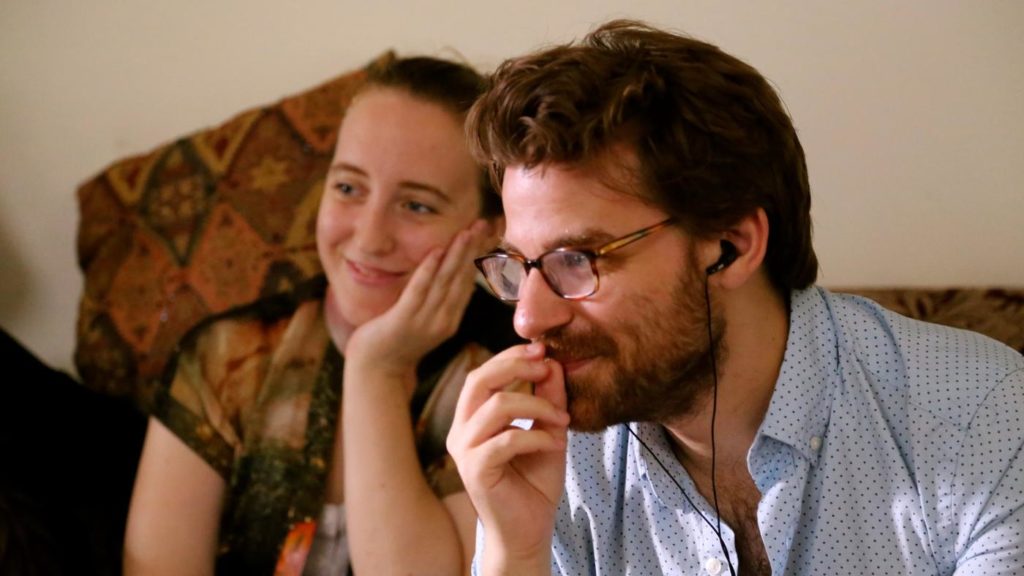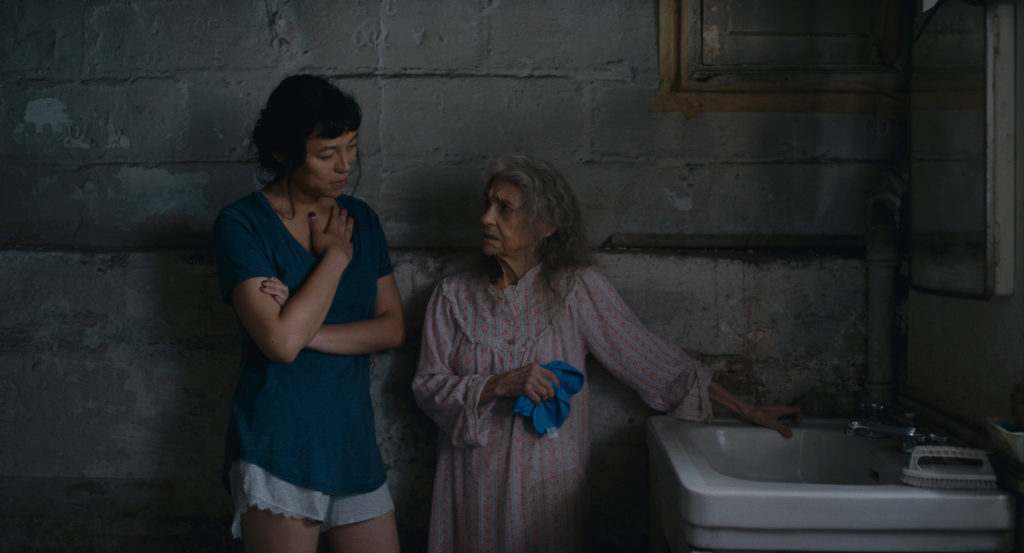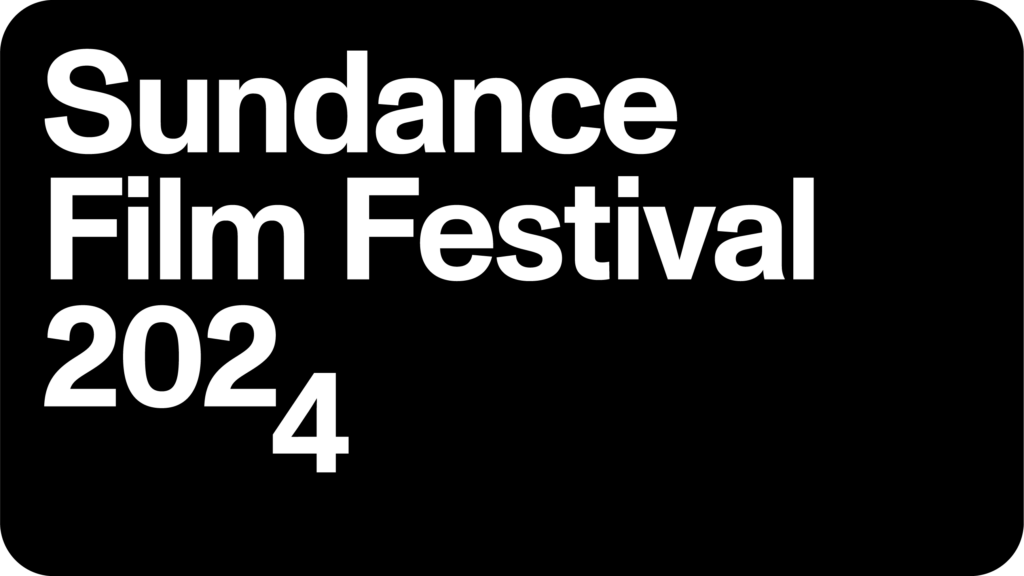Since directing his first short film in 2006, STEPHEN CONE has become quite the prolific filmmaker: Five short films and eight features in just over a decade. The Illinois-based writer/director has even balanced acting work (for stage, film, and TV) and teaching (at Northwestern University) with his movies (which include the microbudget critical successes The Wise Kids and Henry Gamble’s Birthday Party). Cone’s large body of work has resonated enough to already earn him a career retrospective at New York’s Museum of the Moving Image, coinciding with the release of his most recent feature, the coming-of-age film PRINCESS CYD.
Princess Cyd follows 16-year-old Cyd (Jessie Pinnick) as she spends a summer in Chicago visiting her novelist aunt (Rebecca Spence), and the personal and sexual awakening she experiences there. On the heels of a successful festival run (winning Best Film at the Chicago International Film Festival, Best Director at the Kaleidoscope LGBT Film Festival, and the Audience Award at the Sidewalk SHOUT Film Fest), Princess Cyd was released in New York and Chicago theaters in November, and will open in L.A. on December 1 (it’s Cone’s first film released theatrically in Los Angeles!). Distributed by Wolfe Releasing, the film comes out on DVD and VOD on December 5.
Stephen Cone was nice enough to take some time to speak with us about Princess Cyd and his very busy filmmaking career.
——
COLIN McCORMACK: You had a feature in the most recent Filmmaker Magazine, which was really great. You talk about your career, you break down some of your decision-making for Princess Cyd, but I think more importantly for a lot of filmmakers reading it, you broke down your budget. In a time when so many filmmakers are really cagey about their budgets, why do you find it important to have transparency?
STEPHEN CONE: Well, I raise the funds myself, just with a small group of people [who] put together the budgets, so there aren’t really middle-men in my process. So there’s no reason for me to be cagey because I own the numbers. I guess some people see $180,000 as a lot of money, but I feel like most filmmakers understand that that’s not actually a lot of money. And hopefully, if you see the film and you see the numbers, it’s inspiring in some way, just in terms of, [you] don’t need $750,000 to make a movie. [You] don’t even need half-a-million. You can actually do work of a certain caliber under $200,000. That’s always really inspired me, and that sort of information doesn’t get out enough. I think audiences just assume that every movie costs a million dollars [laughs], so it’s like, Oh! Your budget is this other movie’s catering budget. So that can be really exhilarating.
CM: As your career has gone on, has it gotten easier in terms of raising money for your films? Have you used the same process for each project?
SC: It’s always hard because I work pretty quickly, so I can’t always necessarily go back to the same people. And all of these budgets – whether it’s $60,000 or $180,000 – are put together from a wide variety of individuals. There’s no primary financier in any instance. It’s a really particular process and a really nerve-wracking process. Like, I need $150,000, and you just start asking people. You have to go about it with humility, you have to have an understanding that if you think they can give you $10,000, then you might get $1,000. There’s this process of, I know five people who could fund this whole movie. Why would they not fund my film? And then they either give you zero dollars, $500, $1,000, and that’s when you sort of realize, This is going to be a long haul, and I’m going to have like 35 producers on this film. And by “producers,” I mean producers in name, not in creative participation. Because in every other way these movies are severely streamlined, it’s only in the financing that it’s so widespread and populated. It’s always hard and it’s exhausting and it’s how I’ve made movies for the last twelve years, just from individuals. So I’m ready to stop doing that. [Laughs]
CM: Being based in Chicago, how did you find the creative community there? You have your own collaborators that stick with you from project to project as well as new people?
SC: It’s a pretty close-knit community, so people are aware of the gaffers or first ACs who are doing really good work and who also have really solid cinematography skills. People are very generous here, so if a favorite DP is not available then most DPs here will be like, “There’s this young guy coming up, he’s doing some really interesting stuff and you might want to look into him.” I’d say maybe 60% of the time I’ve worked with the same people, 40% of the time I work with brand-new people, and sometimes that’s a desire to switch it up and not for any other reason. But it’s great, I’ve always considered Chicago very much an open workshop where people share and are generous with their time and their recommendations. Princess Cyd happened very fast, so it’s mostly new collaborators on that, but the vibe was no different. It was open and warm and kind.
CM: In terms of casting local talent, how did you find them? Particularly your two lead actresses.
SC: There are only a couple of major casting directors in town and one of them is a company called PR Casting – that stands for Paskal Rudnicke, it’s Mickie Paskal and Jennifer Rudnicke – and I’ve worked with them for the last seven or eight years on everything I’ve done. They’re really wonderful casting directors who work both locally and nationally. First of all, they’re great about meeting me where my budget is, which not all casting directors are willing to do. But also they bring in so many different kinds of people, people of different ages that I might not have thought about. They’re really good at giving me out-of-left-field options and expanding the possibilities for the roles. It’s a boring answer, but it’s an exciting process.
CM: How long did it take you to find Jessie Pinnick for the role of Cyd?
SC: Oh, immediately. But the funny thing about her is that the casting directors did some pre-recordings of people that they didn’t know, and they didn’t have me come in. They just showed me some tapes, and [Jessie] was on one of those early ones. Then for the callback, she was out of town so we had to Skype. So her two auditions were not in the room and I met her for the first time on set.
CM: Whoa. So no time for rehearsals, I assume?
SC: No rehearsals. It’s funny ‘cause I was a theater major in college and I really respect the theatrical process, but no, I’ve never rehearsed a movie in advance. We all just cast amazing actors and you trust them and toss them some humble words of wisdom at the beginning and you go for it.
CM: You said it was a pretty quick turnaround in terms of getting Princess Cyd going. Did you have another film in the works that fell through?
SC: It didn’t really fall through, I just felt like I was rushing it. This goes back to my answer about it being very exhausting raising a micro-budget from 30 or 40 individuals, and I had thought that Henry Gamble, my previous movie, would be the last time I was going to do that. So I had this bigger movie I wanted to make, and around June of last year I realized that the script wasn’t ready and I was kind of stupidly rushing into what was supposed to be my first larger-budgeted film. And rather than take a nice leisurely summer off, I just decided to make another small movie [laughs]. I’d had the idea previously, but technically speaking the entire process, from conception and writing to wrapping the shoot, lay within early-July to late-September. So the whole thing happened in an eight- to ten-week turnaround.
CM: That’s crazy. And you actually had – which I see in the Filmmaker article – you had insurance! And permits! You dotted all your i’s and crossed your t’s.
SC: It all happened in August. Honestly, it all happened in August. Every single moment of technical, official pre-production happened between August 1 and August 30, when we started shooting.
CM: That’s amazing. Do you normally, when you’re writing, write with budget in mind? Or do the types of stories you want to tell naturally fit into a smaller-scale?
SC: Yeah, I think both of those things are true. I usually write early in the year what I want to make in the summer, knowing that what I’m writing will be makeable. That’s why I have very little experience in developing a script over time for a more ambitious shoot. All of my experience is: Write a movie in December, shoot it in June. That’s the story of my last decade.
CM: You’ve edited your own films in the past, but not Princess Cyd. What was the decision behind that?
SC: I was just ready to try something different. And also I was sick and tired of the workflow [laughs]. It excited me. It always excited me to be my own editor, but on this movie it excited me to bring in a partner and maybe actually have them start cutting while we were shooting… And I got really lucky ‘cause I’ve always been hesitant to relinquish that duty over to others, but I found a soul mate in editing, Christopher Gotschall.
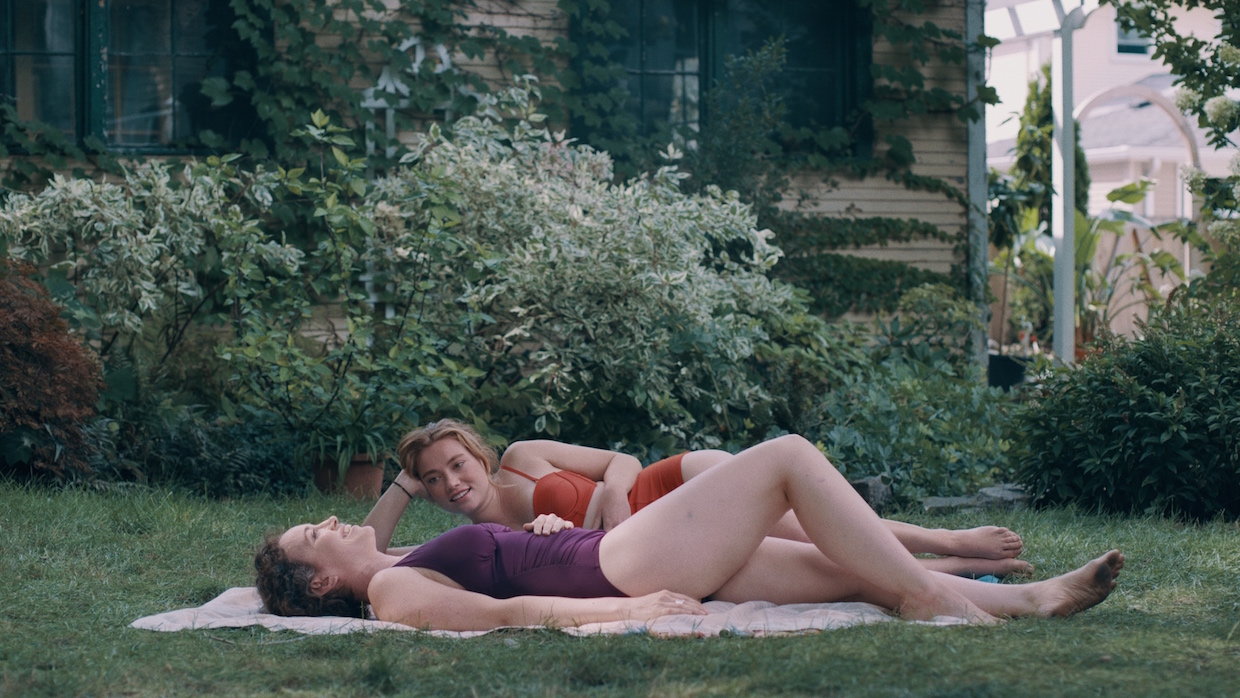
CM: I saw you budgeted for festival publicity, and you’ve had a lot of success at festivals with your films. Do you approach the submission process differently project by project, seeing what would be a better fit for which type of festival? Or is it not quite that tailored?
SC: I’ve never been able to crack that. I’ve never been able to understand what festivals want. Yes, they always have success after five months of rejections. I used to try to predict what festivals wanted. Now I don’t. I just try to make the movie I want to make, then I send it out and see who likes it [laughs]. It’s as simple as that.
CM: When you travel to a festival where your film is screening, what do you aim to get from each festival when you’re there?
SC: Honestly, two [things], one is sort of romantic and one’s just sort of convenient. I go to literally give the movie to the audience. I think there is something special, when you can be there, of saying, “Hi, I’m Stephen. Here’s my movie.” That’s an interesting conversation to have and it’s not something that happens when people are watching something on Netflix or whatever. The other reason, to be honest, is just to go experience a new city. Or [visit] a city I’ve been to before and love. So it’s to share the movie and just to get out of Chicago.
CM: Speaking of Netflix, Henry Gamble’s Birthday is on Netflix. Have you noticed a spike in people recognizing your film or you as a filmmaker because of that ease of being able to watch on Netflix?
SC: Yes. 100%. It’s Tweeted about every day, three or four times a day. A lot of it has to do with [Henry Gamble co-star] Joe Keery being on Stranger Things. But even then, they’re able to find it on Netflix. They’re able to Google, “What else has Joe Keery done?” and then they see it.
CM: You have a lot of similar themes across your films: Faith and queer identity and adolescence. Do you subscribe to the “Write What You Know” rule? Especially since you’re a teacher, what do you encourage your students to pursue in terms of writing?
SC: That’s a really interesting question. As a piece of advice, “write what you know” kind of bores me. But on the other hand, I do it; that’s what I sit down and get excited about. I think it’s probably a great way to start and just see where it goes. It’s worth saying that I spent the first three to four years of my self-education dabbling in other kinds of stories and trying to figure out what kinds of stories to tell. And it was only when I actually lowered my ambitions a little and made something personal and autobiographical that I started to find my voice. So all of that is to say, it might be cliché to advise people to write what they know, but it’s not bad advice. And it’s opened up different ways of telling similar stories to me. I wouldn’t have necessarily expected to write what I know, but you kind of come around to it.
CM: In terms of you teaching, as someone who didn’t go to film school how do you think your approach to teaching film students differs from someone else?
SC: [Laughs] These classes are entirely devoid of terminology or theory. I’m literally just talking about these things from a very practical perspective. I’m able to stand in front of these classes and be like, “Hey, I shouldn’t really have a job here. I was a theater major, I have no film education, I’ve never taken a film class. So let’s just do this class and see what happens and I’ll do the best I can.” But I think they like it. I think they like that I’m making films. I’ve never taken a film class, but I’m teaching them and I think there’s something cool about it. The more you can demystify the process of making a movie, the more you unlock peoples’ passions for these forms… Especially teaching at Northwestern, there’s a lot of theater student/film student overlap. It’s so exciting to see theater students fall in love with editing because that’s what I did. I’m a theater major who fell in love with the process! So it’s super personal, it’s super direct, and I go light on traditional terms and theories.
CM: Do you have your next project lined up? Do you think Princess Cyd will end up being the last of the ultra-low budgets like you thought Henry Gamble was going to be?
SC: I think it’ll be the last one for now, but I could see myself in a couple years going off to do a smaller thing on the side again. But no, next summer I want to make what I was going to make last year.
CM: That’s going to be in Chicago as well?
SC: No, it’s set in the South. So hopefully the Carolinas, but who knows? You never know where tax incentives will drag you.
CM: You’re still in your thirties and yet you’ve already had a career retrospective at the Museum of the Moving Image-
SC: I know, isn’t that ridiculous?
CM: How was that for you? Do you like to think about your “legacy,” for lack of a better word, or is that just a weird distraction?
SC: I mean, they billed it as an Early Career Retrospective, which still seems absurd to me. But I really appreciated it, because I made these early films like The Wise Kids and Black Box without any connections at all whatsoever, and they had weird lives on the festival circuit. And if I’m lucky enough to have a retrospective in 20 years, I don’t know that these smaller films would be shown. So for me, this was about nudging these interesting, early experiments up to the forefront and kind of reminding people that they exist. So it was really special. In a practical sense, I suspect this was the last time that these movies will ever all screen publicly, so that’s exciting. Also, I’m someone where I feel like it’s taken me twelve years and multiple films to achieve the word-of-mouth of a single first-time filmmaker [laughs]. I’ve had the most slow-motion “ascent” because I haven’t had the one movie that caught on. It’s been this sort of this collective body that’s caught on, and so I need the encouragement, to be honest [laughs]. I needed the retrospective to happen to encourage me because it has not been easy. I haven’t been embraced in traditional film circles. I’m stubborn [so] I’m going to keep going no matter what, but the retrospective was really nice in terms of, “We take these early films seriously whether you do or not.”
CM: You’re the decade-long overnight sensation.
SC: [Laughs] Right, well I feel like it’s not even dusk yet. I’m a half-night something, on my way to some sort of dawning.
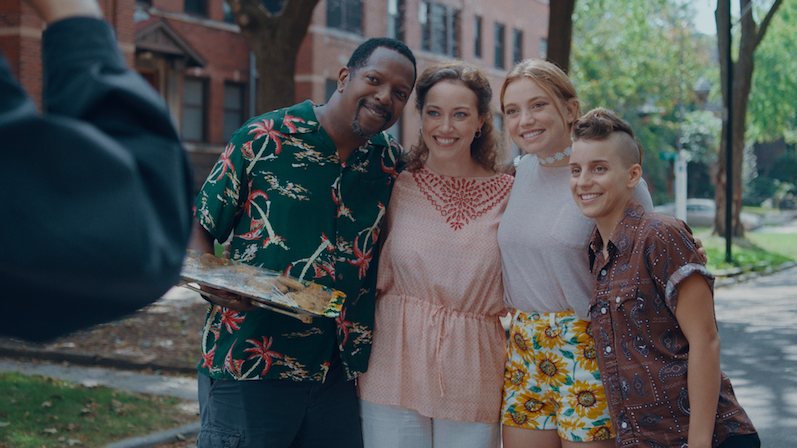
__
Thanks to Stephen for talking to us about his career and PRINCESS CYD. Follow the film on Facebook.
This interview has been edited for clarity.
If you’re an independent filmmaker or know of an independent film-related topic we should write about, email blogadmin@sagindie.org for consideration.

